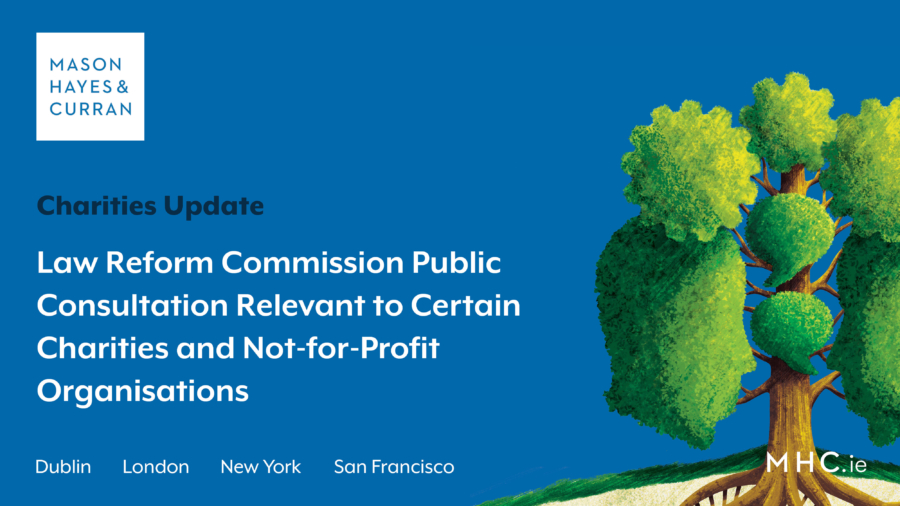Law Reform Commission Public Consultation Relevant to Certain Charities and Not-for-Profit Organisations
Liability of clubs, societies and unincorporated associations

The Law Reform Commission (LRC) recently published a consultation paper entitled “Liability of clubs, societies and unincorporated associations”. Submissions are being sought from the public on the LRC’s proposed law reform objectives and their proposed solutions to some of the legal challenges posed by unincorporated associations (UA). This consultation paper will be of particular interest to charities and not-for-profits that are operating under a civil structure other than a company limited by guarantee as the submissions will inform the LRC’s proposals for reform in this area of law.
Pros and cons of UAs
The LRC begins by considering the relative advantages and disadvantages of operating as a UA. Some of the advantages identified are:
- Relatively easy and inexpensive to create
- Suitable for smaller clubs, charities and not-for-profits, or those whose activities are to be carried out in the short term, and
- Regulatory requirements/upkeep are minimal
Some of the disadvantages identified include:
- No limited liability for the members of the UA
- Depending on the circumstances, committee members or the members of the UA (whether as a whole or individually) may sometimes be held liable for contracts entered into on behalf of the UA, and
- As a UA does not have a separate legal identity, distinct from its members, it cannot hold property in its own name
The LRC identifies a number of difficulties in applying and enforcing the law for an entity without a separate legal identity including:
- A UA cannot sue or be sued in its own name
- A UA cannot enter into contracts, equally, you cannot contract with a UA
- A member of a UA cannot sue the UA – such a claim would have to be brought against the individual members which is not permitted in law as this is regarded as an individual effectively suing themselves
- There is potentially personal liability for members/committee members of a UA in contract for the full extent of the contract
- It is difficult to determine who is the employer of any employees, and
- There is no clarity on whether a fine imposed on a UA is to be paid out of the UA funds or by its members
Proposed solutions
The LRC notes that incorporation as a company limited by guarantee (CLG) would address many of the disadvantages and issues identified. The LRC recognises however that many organisations may not wish to register as a company for a variety of reasons. The LRC has therefore proposed three alternative models which aim to address some of those issues:
Model One: Non profit registered association
This approach would require a UA to comply with a registration process in order to gain separate legal personality. However, this proposed model would not confer the protection of limited liability on members as the LRC considers that the benefits of limited liability should be subject to the type of reporting and oversight that comes with being a CLG.
The benefits of a voluntary system of registration would include:
- Solving the issue of entry into contracts and ownership of property
- Third parties (including members) could take claims against the UA
- Registration would assist other regulators in accessing details of key officers and members of the UA and generally provide greater transparency for third parties
- Fines/awards against a UA could be paid from the funds of the UA, and
- As this is an ‘opt in’ system, those who wish to remain unregulated could do so
The disadvantages would include:
- Administrative burden and costs
- Smaller UAs may be unaware of the requirement to register to gain this status/be unwilling to register/be unable to pay cost of registration
- A system of registration with minimal oversight would arguably result in inadequate oversight of activities of associations to correspondence with the privilege of corporate protection for members, and
- Registration may misguide people as to existence of regulation, which would not exist
Model Two: Automatic conferral of separate legal personality
This model proposes that all UAs that fulfil particular criteria would automatically acquire separate legal personality, thereby creating a form of body corporate with perpetual succession. As with Model One, this approach would not include limited liability for the organisation’s members. This approach was also recommended by the Scottish Law Commission and is the approach adopted in a number of states in the US.
The benefits and disadvantages would be largely the same as under Model One without the need to comply with ongoing registration requirements. This in itself is a benefit from the UA’s point of view but might be seen as a disadvantage for third parties as there is no public register and no transparency.
One approach suggested with this model is to set out in statute a clear and unambiguous set of criteria for the types of association that would come within the scheme.
The LRC invites consultees to consider what criteria should apply if this is the preferred approach and suggests that the emphasis should be on the association’s governance arrangements.
Model Three: Legislation to address liability (civil and criminal) and property issues
This model proposes that rather than conferring separate legal personality, the law should specify how UAs are to be held liable (in contract, tort and for criminal offences) with a series of focused reforms that do not alter the legal status of UAs.
Certain aspects of this model would also be needed to address those difficulties that are not otherwise addressed by Models One and Two. For example, specific legislation could provide that:
- A contract can be entered into by a UA, provided the UA’s rules have been complied with and the signatories had authority to bind the UA;
- Members of UAs are not liable in contract, tort, criminal or regulatory law by reason only of their membership of a UA, (although members remain liable for their own wrongdoing);
- UAs can be litigated against or prosecuted in their own name as though they are a corporate entity;
- Rules of court or legislation relating to the service of documents for legal proceedings are to have effect as if a UA were a body corporate, with a series of practical provisions on identifying appropriate members and officers for service;
- A fine imposed on a UA on its conviction for an offence under the legislation is to be paid out of the funds of the UA rather than its members; and
- The rule whereby members of a UA are prevented from suing an association of which they are a member would be abolished.
Under this Model Three approach, these provisions would apply to all UAs, regardless of whether they were registered or not or whether they met certain criteria. There would therefore be no need for a UA to register or take any steps to organise its governance arrangements in a particular way. There would be no public register and therefore no transparency regarding UAs. UAs would however remain unable to hold land in their own name.
The LRC is seeking submissions on the suggested areas where legislative reform could be introduced and is also seeking specific feedback on a series of questions raised regarding criminal proceedings against UAs and the use of property of a UA towards damages in cases against a UA.
Conclusion
The LRC is inviting submissions on the questions posed by Wednesday 15 March 2023. Our team will be preparing a submission to the LRC on this topic regarding the particular interests and requirements of our charity and not-for-profit clients. Individual charities and not-for-profits may of course make their own submissions to the LRC should they wish to do so or may seek our advice on a submission they are considering.
Links to the executive summary, full text version, and plain English version of the consultation paper can be found here: https://www.lawreform.ie/news/law-reform-commission-publishes-consultation-paper-on-liability-of-clubs-societies-and-other-unincorporated-associations.1106.html
For more information and expert advice, please contact a member of our Charity and Not-for-Profit team and we would be happy to discuss it with you.
The content of this article is provided for information purposes only and does not constitute legal or other advice.
Share this:


